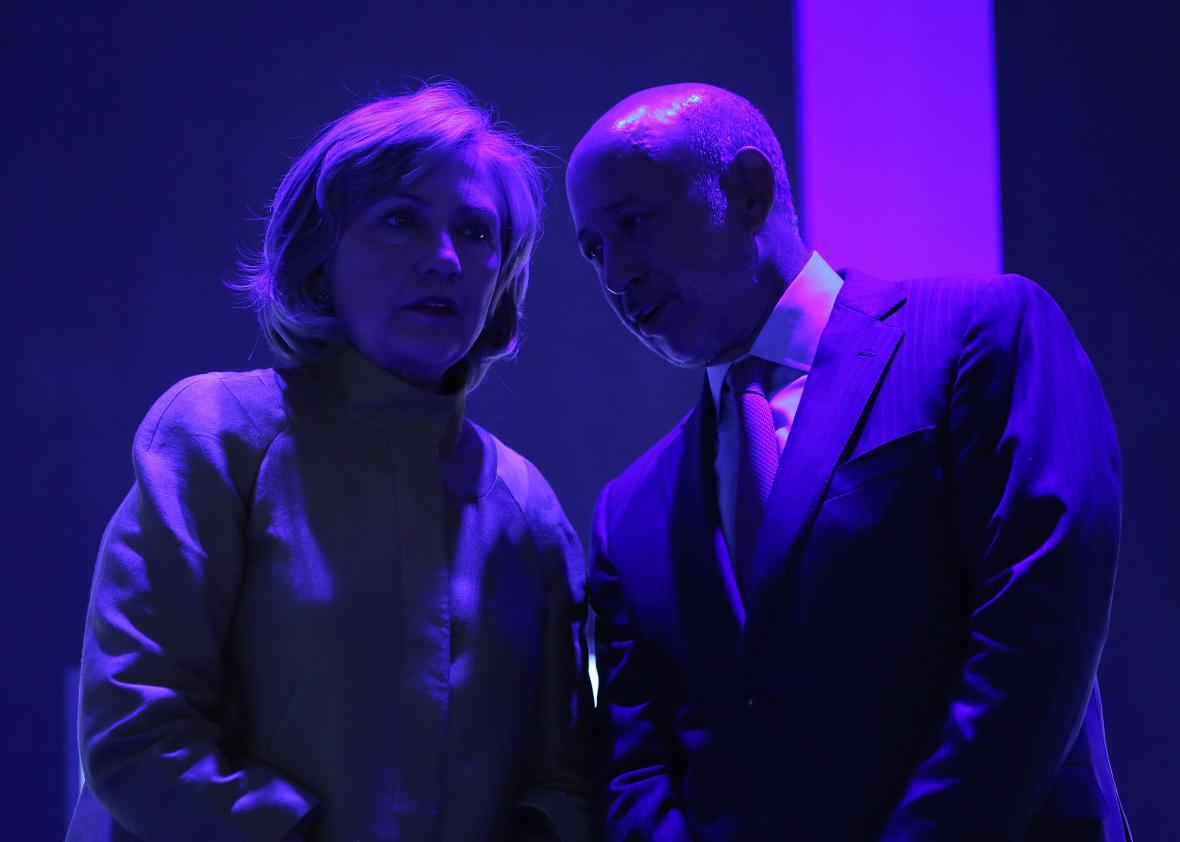Pressed during Thursday’s Democratic debate, Hillary Clinton said that she would “certainly look into” releasing the transcripts of the paid speeches she gave in private to Goldman Sachs and other Wall Street institutions. By Sunday, her promised careful consideration was apparently complete. “Let everybody who’s ever given a speech to any private group under any circumstances release them—we’ll all release them at the same time,” Clinton said on ABC’s This Week, noting that her opponents from both parties have also “given speeches to groups.” Her conclusion: “These rules need to apply to everyone.”
The answer was both tone-deaf and disingenuous. Clinton’s six-figure speeches are a point of contention in the Democratic race not because she was paid to give them but because of who paid her to give them. Bernie Sanders is running on the idea that Washington and Wall Street are too cozy and that the former will never be able to effectively regulate the latter as long as the status quo continues. He’s not challenging Clinton because he thinks she rigged the game; he simply contends that she is playing it like everyone else in politics.
Clinton’s decision to ignore the transcript controversy in hopes it will go away is hardly a surprise. She deployed a similar strategy early last year in the face of questions about the overlap between her family’s financial interests and those of the Clinton Foundation’s global donors, and to defend her use of a private email server to conduct official government business while secretary of state. Hillary responded to those controversies like she is responding to this one: by suggesting they are not controversies at all. Most politicians, she says, do the same thing, but she alone is treated differently. Many of her supporters agree, though many Democratic voters do not.
In a vacuum, the transcripts are a relatively minor issue. She is under no legal obligation to release them, and no one is seriously accusing Clinton of promising a roomful of bankers that she’d do whatever they want if she ends up in the White House. The worst anyone would probably discover from reading the transcripts is that Hillary said some relatively nice things about the financial industry while talking of the need for Washington and Wall Street to work together, a message many politicians might give in the same situation. But Clinton knows that’s not a message many progressives want to hear right now. She has every reason to fear that snippets of her Goldman speeches would be quoted in attack ads and on cable news shows for days and weeks to come. She’s betting that it is better to risk reminding voters of her less-than-transparent ways—which have been well-documented—than it is to provide tangible evidence that she says one thing in public to working-class voters and another in private to the 1 percent.
Her more immediate problem, though, is that she’ll continue to pay a price for keeping the transcripts under lock and key. The media’s coverage of the controversy will only remind voters that Clinton was paid millions from people working in the very industry she promises to reform. The questions will also keep her on the defensive at a time when she needs to be going on the offensive against a surging Sanders. And making matters even more awkward is that her But all politicians do it defense actually plays directly into Sanders’ larger argument, which is that too many politicians do it.
Clinton’s inability to fully deflect that criticism is only the latest evidence that she still doesn’t have a way to assure skeptical voters that the millions of dollars Wall Street has given to her foundation, her campaigns, and directly to her and her husband would have no bearing on her presidential decision-making. Asked at a debate last year about her ties to the financial industry, she answered with a non sequitur about women and 9/11. Asked by a reporter last month about releasing the transcripts of her Goldman speeches, she laughed and turned away. Asked at a town hall last week why she accepted $675,000 in speaking fees from the investment bank, she said, “Well, I don’t know, that’s what they offered.” Like her transcript defense on Sunday, those are hardly the answers political strategists dream of—but if Clinton had better ones, we’d have heard them by now.
Read more Slate coverage of the Democratic primary.
